英语高中北师大版高二下Unit19《Language》(Lesson 1)课件
文档属性
| 名称 | 英语高中北师大版高二下Unit19《Language》(Lesson 1)课件 | 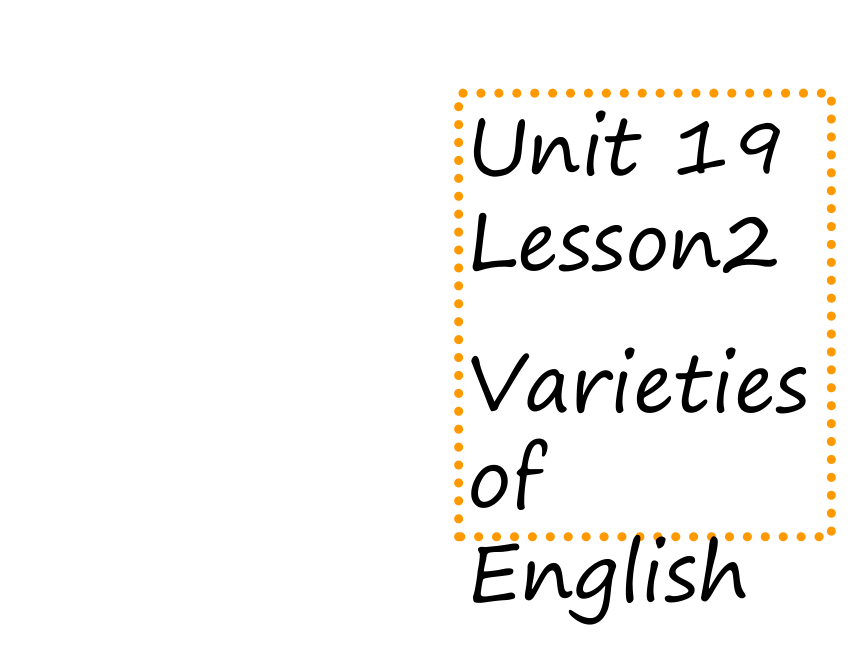 | |
| 格式 | zip | ||
| 文件大小 | 77.0KB | ||
| 资源类型 | 教案 | ||
| 版本资源 | 北师大版 | ||
| 科目 | 英语 | ||
| 更新时间 | 2013-04-03 16:44:07 | ||
图片预览

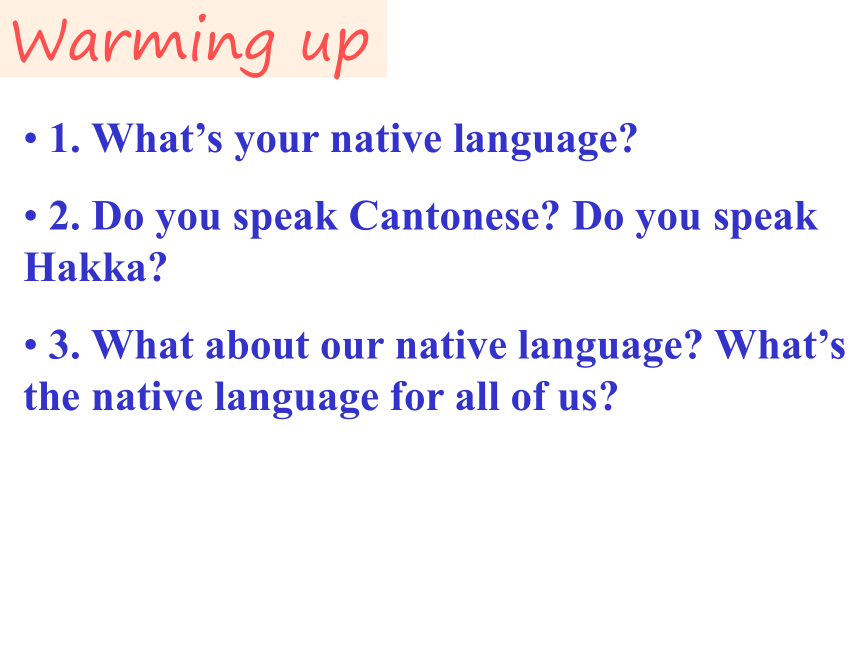
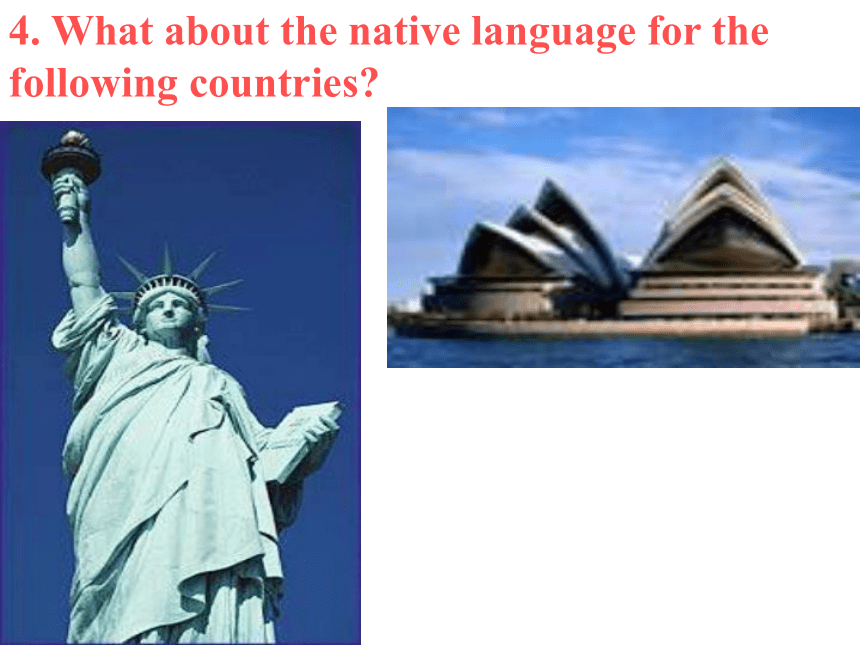
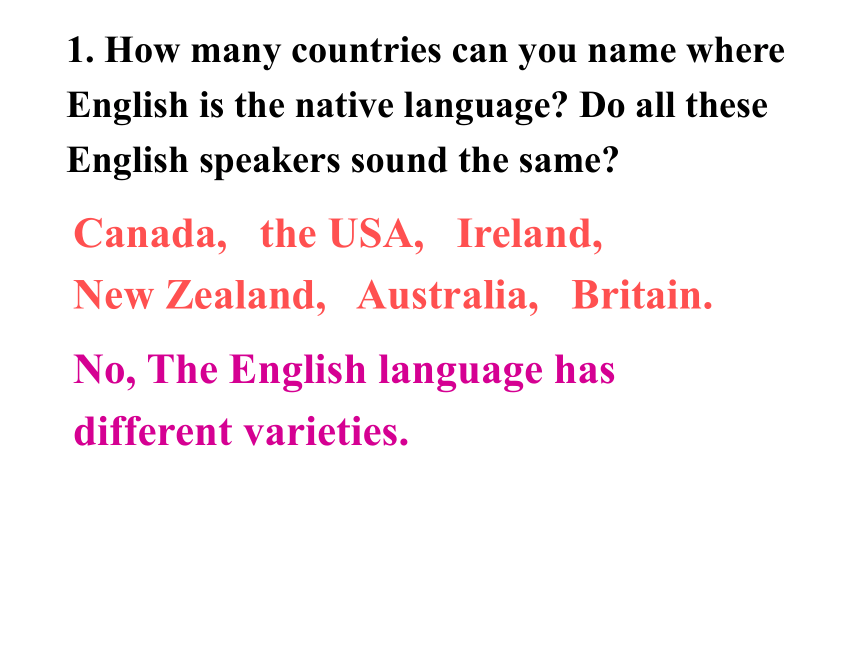
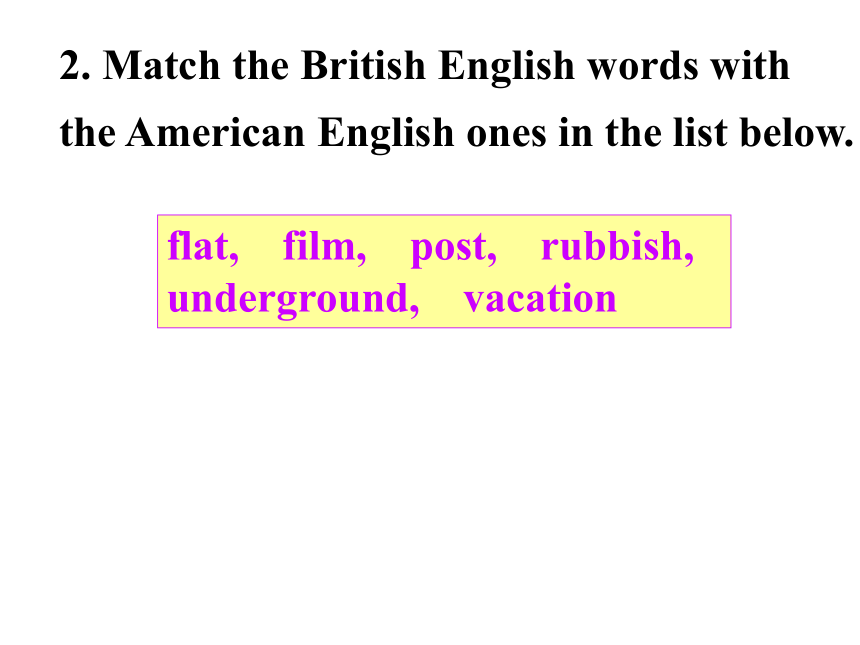
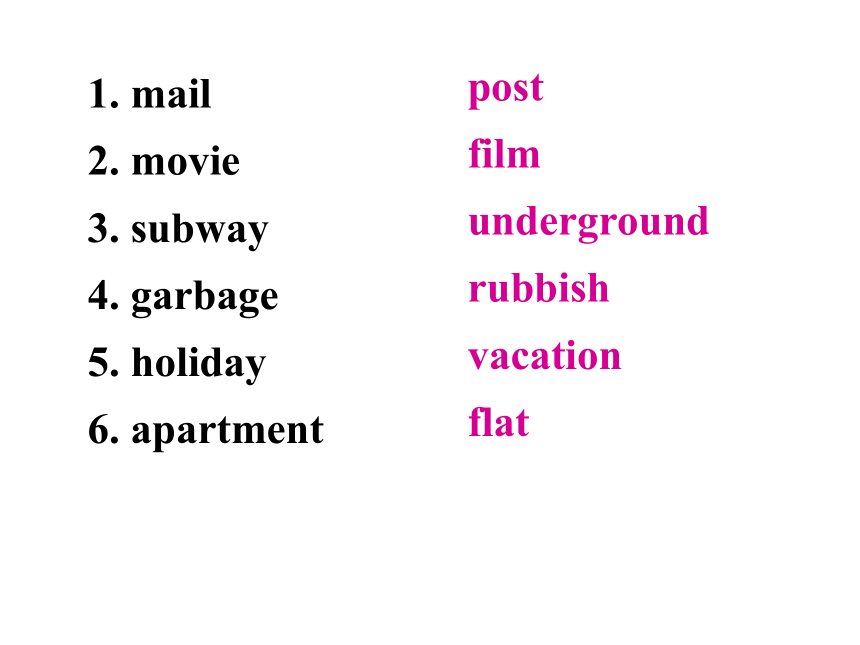
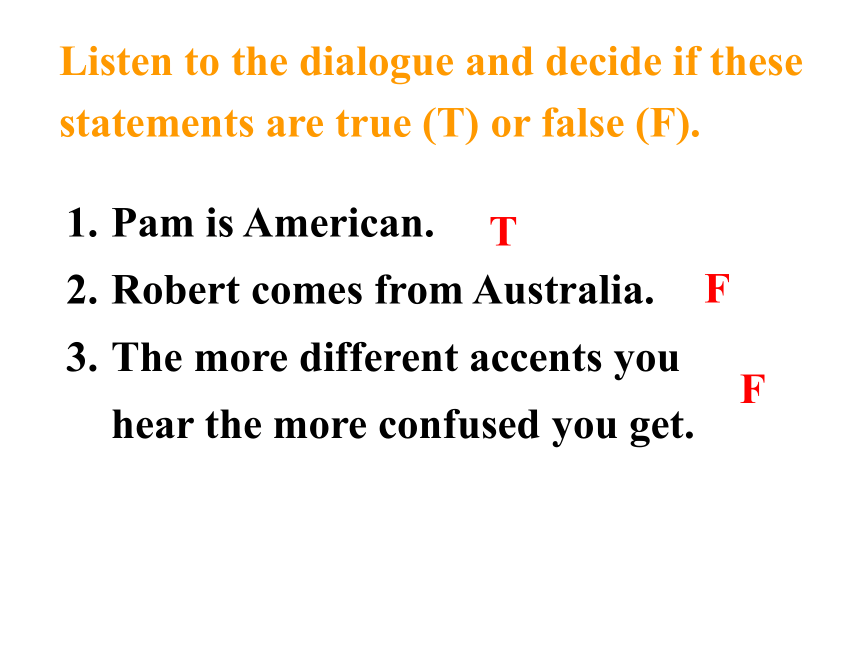
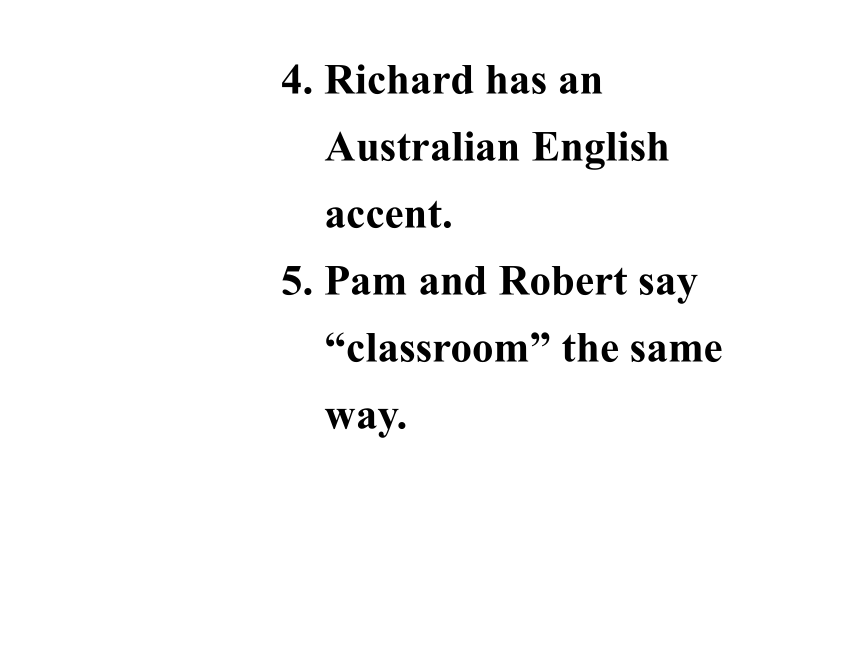

文档简介
课件23张PPT。Unit 19 Lesson2
Varieties of English Warming up 1. What’s your native language?
2. Do you speak Cantonese? Do you speak Hakka?
3. What about our native language? What’s the native language for all of us?4. What about the native language for the following countries?1. How many countries can you name where English is the native language? Do all these English speakers sound the same?Canada, the USA, Ireland, New Zealand, Australia, Britain.No, The English language has different varieties.2. Match the British English words with the American English ones in the list below.flat, film, post, rubbish, underground, vacation mail
movie
subway
garbage
holiday
6. apartmentpost
film
underground
rubbish
vacation
flatPam is American.
Robert comes from Australia.
The more different accents you hear the more confused you get.Listen to the dialogue and decide if these statements are true (T) or false (F).TFFTF4. Richard has an Australian English accent.
5. Pam and Robert say “classroom” the same way.Why do you think Liang Weimin thought all English speakers sounded like BBC World Service reports?Liang Weimin didn’t know people have different English accents depending on where they come from .Listen to the sentences and decide whether they are spoken in an American accent (A) or a British accent (B).Would you like a glass of water?
2. She’s dancing in the classroom.
3. Let me give you an example.
4. I like to eat tomatoes.BAABListen to these sentences and decide whether they are spoken in an Australian accent or a British accent.1. Did you say you’re going sailing this weekend?
2. I’m going on a date this Saturday!
AustralianBritish3. How much did you pay for the razor?
4. The mail always comes on Tuesdays.
5. What did you say when he was late?
6. Sorry I’m late. I had to pay my bills.
AustralianAustralianBritish BritishListen to the conversation and decide which speaker is American, which is British and which is Australian.AmericanAustralianBritishListen again and use these expressions to complete the Function File.
Would it be possible, Could you, I’m sorry but, I was wondering if, Do you think I could, Will you be, I’d prefer not, I’m afraid, Is it all right if, If you’d like, Could you possibly, I wonder if1. ___________ to fill in this form here, please.
2. I know this is unusual, but after the long flight ____________ to go on with the group.
3. _____________ I just go off on my own a bit later?If you’d likeI’d prefer notIs it all right if4. _________ she won’t be here till about ten o’clock.
5. __________ having lunch in the hotel, sir?
6. _________________ give me a map of the city, please?Will you beCould you possiblyI’m afraid7. ________________ you could give me information about visits to some of the buildings in Toronto, please?
8. __________________ have something about the modern buildings, please?I was wondering ifDo you think I could9. _________ ask someone else, please?
10. __________ I could ask you something?
11. _________________ to stay over an extra night in New York?
12. ____________ we have to keep to the timetable, sir.Could youI wonder ifWould it be possibleI’m sorry butPronunciation. Listen and think about language and intonation. Which request are: polite and indirect?
too direct and possibly rude?1.
2.
I want a seat by the window.Could you possibly give me a seat by the window?b)a)3.
4.
5.
6.
Is it all right if I pay by credit cark.I’ll pay by credit card.a)b)If you’d like to wait a moment, please.Could you just wait a moment, please?a)a)Help me with my bags, will you?I was wondering if you could help me with my bags.7.
8.a)b)Now listen and repeat six polite requests.1. Could you possibly give me a hand with my bags, please?
2. Is it all right if I leave my bags here?
3. I was wondering if I could have breakfast earlier?4. Could you tell me where the restaurant is, please?
5. Do you think I could have a menu, please?
6. I wonder if I could have another egg, please?
Varieties of English Warming up 1. What’s your native language?
2. Do you speak Cantonese? Do you speak Hakka?
3. What about our native language? What’s the native language for all of us?4. What about the native language for the following countries?1. How many countries can you name where English is the native language? Do all these English speakers sound the same?Canada, the USA, Ireland, New Zealand, Australia, Britain.No, The English language has different varieties.2. Match the British English words with the American English ones in the list below.flat, film, post, rubbish, underground, vacation mail
movie
subway
garbage
holiday
6. apartmentpost
film
underground
rubbish
vacation
flatPam is American.
Robert comes from Australia.
The more different accents you hear the more confused you get.Listen to the dialogue and decide if these statements are true (T) or false (F).TFFTF4. Richard has an Australian English accent.
5. Pam and Robert say “classroom” the same way.Why do you think Liang Weimin thought all English speakers sounded like BBC World Service reports?Liang Weimin didn’t know people have different English accents depending on where they come from .Listen to the sentences and decide whether they are spoken in an American accent (A) or a British accent (B).Would you like a glass of water?
2. She’s dancing in the classroom.
3. Let me give you an example.
4. I like to eat tomatoes.BAABListen to these sentences and decide whether they are spoken in an Australian accent or a British accent.1. Did you say you’re going sailing this weekend?
2. I’m going on a date this Saturday!
AustralianBritish3. How much did you pay for the razor?
4. The mail always comes on Tuesdays.
5. What did you say when he was late?
6. Sorry I’m late. I had to pay my bills.
AustralianAustralianBritish BritishListen to the conversation and decide which speaker is American, which is British and which is Australian.AmericanAustralianBritishListen again and use these expressions to complete the Function File.
Would it be possible, Could you, I’m sorry but, I was wondering if, Do you think I could, Will you be, I’d prefer not, I’m afraid, Is it all right if, If you’d like, Could you possibly, I wonder if1. ___________ to fill in this form here, please.
2. I know this is unusual, but after the long flight ____________ to go on with the group.
3. _____________ I just go off on my own a bit later?If you’d likeI’d prefer notIs it all right if4. _________ she won’t be here till about ten o’clock.
5. __________ having lunch in the hotel, sir?
6. _________________ give me a map of the city, please?Will you beCould you possiblyI’m afraid7. ________________ you could give me information about visits to some of the buildings in Toronto, please?
8. __________________ have something about the modern buildings, please?I was wondering ifDo you think I could9. _________ ask someone else, please?
10. __________ I could ask you something?
11. _________________ to stay over an extra night in New York?
12. ____________ we have to keep to the timetable, sir.Could youI wonder ifWould it be possibleI’m sorry butPronunciation. Listen and think about language and intonation. Which request are: polite and indirect?
too direct and possibly rude?1.
2.
I want a seat by the window.Could you possibly give me a seat by the window?b)a)3.
4.
5.
6.
Is it all right if I pay by credit cark.I’ll pay by credit card.a)b)If you’d like to wait a moment, please.Could you just wait a moment, please?a)a)Help me with my bags, will you?I was wondering if you could help me with my bags.7.
8.a)b)Now listen and repeat six polite requests.1. Could you possibly give me a hand with my bags, please?
2. Is it all right if I leave my bags here?
3. I was wondering if I could have breakfast earlier?4. Could you tell me where the restaurant is, please?
5. Do you think I could have a menu, please?
6. I wonder if I could have another egg, please?
